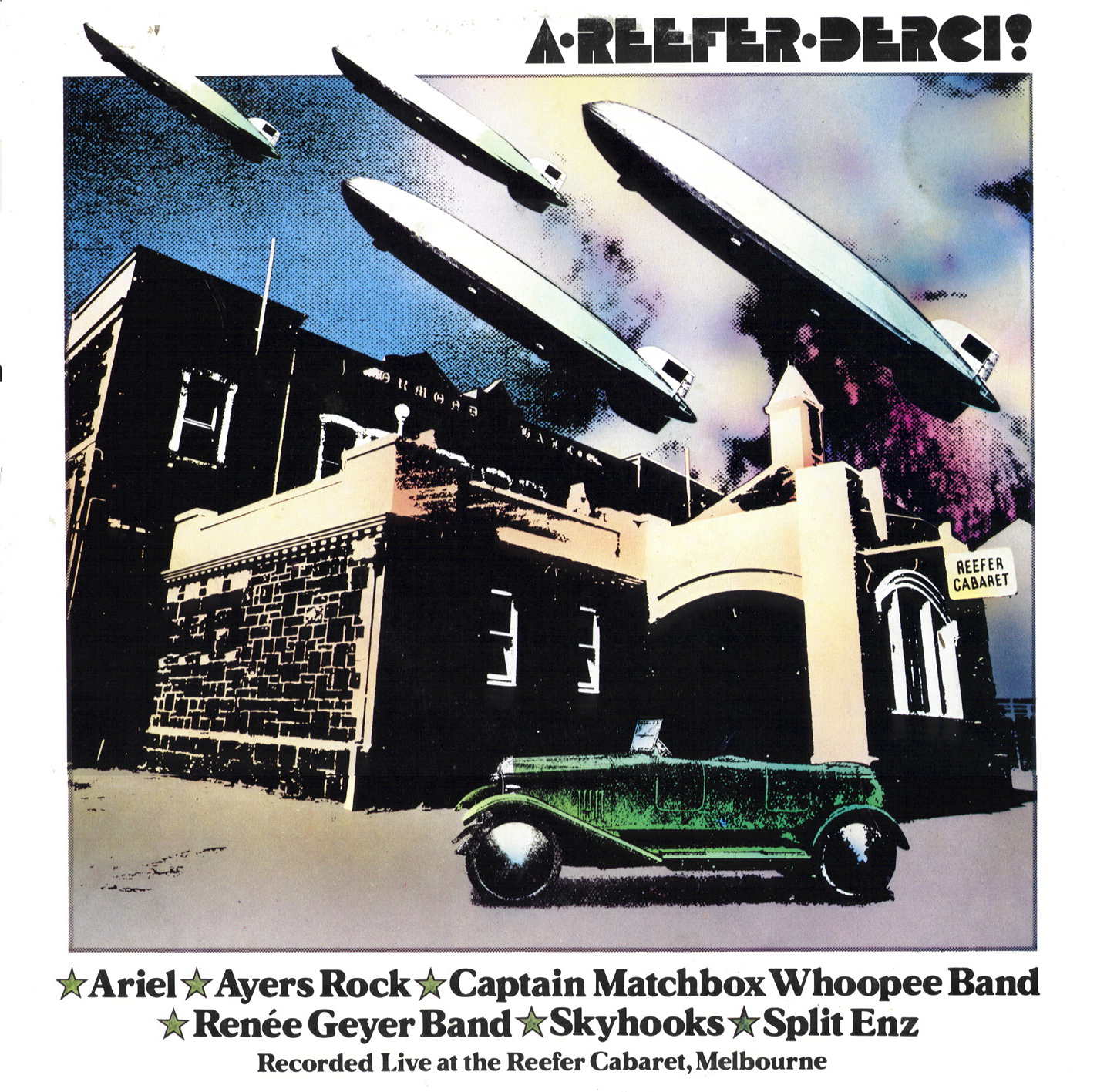LOCATION:
Dallas Brooks Hall, Melbourne
(first show only)
then Ormond Hall, Prahran
OPERATION:
Aug. 1974 - 1976
PROMOTERS:
John Pinder & Mike Roberts

| MILESAGO: Australasian Music & Popular Culture 1964-1975 | Venues |
REEFER CABARET
|
LOCATION: OPERATION: PROMOTERS: |
 The front cover of the 1976 Mushroom live compilation A*Reefer*Derci!.
|
History
The Reefer Cabaret was the successor to the fabled TF Much / Much More Ballroom concert
'happenings' promoted by Bani McSpedden and John Pinder in 1971-72. The
Much More events ended in December 1972, reportedly because of
complaints from St Patrick's Cathedral (who owned Central Hall, where
the shows were staged) about the type of music being performed and the
use of drugs by audience and performers. During 1973 Pinder and
McSpedden reportedly promoted similar events under the title "Stoned
Again" (a name no doubt inspired by the famous Robert Crumb dope
cartoon) but we've been unable to locate any details about these events
as yet.
Like the Ballroom, the Reefer Cabaret was not the name of a
venues per se
(like Catcher or the Thumpin' Tum)
but
rather the title for a
regular concert event held in one of the large community halls
Melbourne that could be rented on a casual or regular basis for dances,
meetings and similar
functions -- in this case, the Dallas Brooks Hall in ??? in inner
Melbourne, and built by the local chapter of the Order of
Freemasons.
Like the Ballroom shows, the Reefer Cabaret events were usually held monthly and typically featured long concert-style performances, with multiple musical acts on the bill, interspersed with comedy, poetry readings, theatrical, dance or novelty performances.
The first Reefer Cabaret show was held on 3 August 1974 at the Dallas Brooks Hall. It starred The Dingoes, soul group Skylight, the avant garde group Wind and rising stars Skyhooks, with its charismatic new lead singer Graham "Shirley" Strahan. The night cost $1200 to stage, and attracted 850 people. Unfortunately the Freemasons, who owned the Hall, were not impressed by the type of music (or its volume), nor by the copious quantities of illicit substances which were consumed by the audience. Roberts was obliged to move the Reefer Cabaret to the Ormond Hall in Prahran, owned by the Blind Institute of Melboume, who apparently didn't have the same qualms about the moral dangers of loud music and dope-smoking. The shows were then presented on a monthly basis, with newer bands such as Madder Lake, Ayers Rock, Split Enz, The Renee Geyer Band and Ariel, who gained invaluable experience before a relatively discerning audience.After the Ball is over ...
Promoter John Pinder has made a great contribution to Australian live performance, especially in comedy. After the Reefer Cabaret, he established the famous Last Laugh comedy venue (1976), which was a foundation stone of Melbourne fertile live comedy scene. He now runs the Big Laugh comedy venue in Parramatta, NSW.
References / Links
Paul Conn
2000 Weeks:
The First Thirty Years of Australian Rock (Moonlight
Publications, 1996)
Stephen Walker
"Invisible Innocence" (originally published in Rhythms magazine)
http://www.skullcave.org/archives/rants/invisibleinnocence.htm
Patrick Dononvan
"Halls for hire, historic cred for free"
The Age,
Melbourne, 11 August 2004
http://www.theage.com.au/articles/2004/08/11/1092102506402.html
Graham "Yogi" Harrison
History of Rock Roadcrews : the 1970’s!
http://www.juliusmedia.com/cxweb/article.asp?ID=92
Radar's United Music Zone Australia
Brewster Brothers / Moonshine Jug & String Band - concert
review
http://www.rumza.com/04ed01_3.html
Gavin Quinn CV
http://home.austarnet.com.au/blistering/cv-gavin/cv4.htm
Ian McFarlane
Encyclopedia of Australia Rock & Pop
http://www.whammo.com.au/encyclopediaList.asp
Ed Nimmervol: Howlspace
http://www.howlspace.com.au/
Dimensions In Time (ABC-TV), 14 July 2003
"Last Laugh"
http://www.abc.net.au/dimensions/dimensions_in_time/Transcripts/s902237.htm